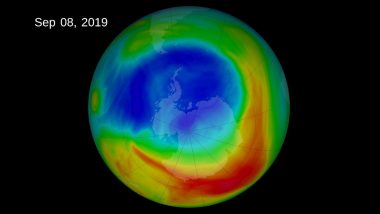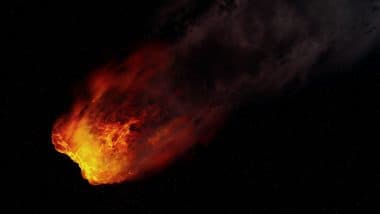The ozone layer is healing from man-made damages caused to it. According to a study, international cooperation on reversing the effect of ozone-depleting chemicals is helping the return of southern jet stream to a normal state. As per the reports, scientists stated that there is a capacity to heal damaged climate phenomenon if the governments take proper measures and deals with the causes. The southern jet stream is a powerful wind that shapes the weather patterns and ocean currents in the southern hemisphere, especially during the summers. Ways to Save The Ozone Layer That Protects Earth From Sun's Ultraviolet Rays.
If governments act promptly to deal with the causes, scientists say that there is a capacity to heal damage climate systems. Until about 2000, it had been shifting from its usual course and moving southwards towards the Antarctic at a rate of one degree of latitude each decade, affecting storm tracks and rainfall over South America, East Africa and Australia.
Lead author Antara Banerjee, a CIRES Visiting Fellow at the University of Colorado Boulder who works in the Chemical Sciences Division of the National Oceanic and Atmospheric Administration (NOAA) who started this work as a Postdoctoral Fellow at Columbia University was quoted as saying, "This study adds to growing evidence showing the profound effects of the Montreal Protocol. Not only has the treaty spurred healing of the ozone layer, but it's also driving recent changes in Southern Hemisphere air circulation patterns."
The effect will have different effects on different regions. In Patagonia, there should be more rain and less carcinogenic ultra-violet light, while in central South America it was previously found to bring more rainfall. Some studies say that the rainfall will be good for Australia which has seen drought in the past years. The restoration is not enough for ozone recovery but efforts to reduce carbon dioxide and methane production by governments.
Since 2000, the ozone layer has recovered from the holes and thinning caused by aerosol chemicals at a rate of about 1% to 3% a decade. If it goes at this rate, the ozone layer over the northern hemisphere and mid-latitudes should heal by 2030s. However, in the southern hemisphere and polar regions, recovery will take longer and may go up to the middle of this century or even by 2060. The new paper, published in the journal Nature, shows that the Montreal protocol paused the southward movement of the jet stream since the turn of the century and may even be starting to reverse it as the ozone hole begins to close.
Scientific evidence of the depletion of the ozone layer over the Antarctic was first presented in 1985. The Montreal Protocol which is an agreement to stop producing ozone-depleting substances (ODSs) was signed in 1987. It forced the world governments to reduce and remove harmful chemicals that cause the problem.
According to earlier research, depletion of the ozone layer was caused by manmade chemical compounds such as chlorofluorocarbons, hydrochlorofluorocarbons, found in fridges, aerosols and other industrial processes. The upper layers of the ozone protect the Earth's surface from the harmful ultraviolet rays of the Sun. The damage of this layer will affect the skin and eyes leading to an increase in skin cancers. The Kigali amendment to the Montreal protocol will help reduce future climate change, by targeting HFC gases, mostly used in refrigeration that has greater effects than carbon dioxide.
(The above story first appeared on LatestLY on Mar 26, 2020 04:07 PM IST. For more news and updates on politics, world, sports, entertainment and lifestyle, log on to our website latestly.com).













 Quickly
Quickly





















